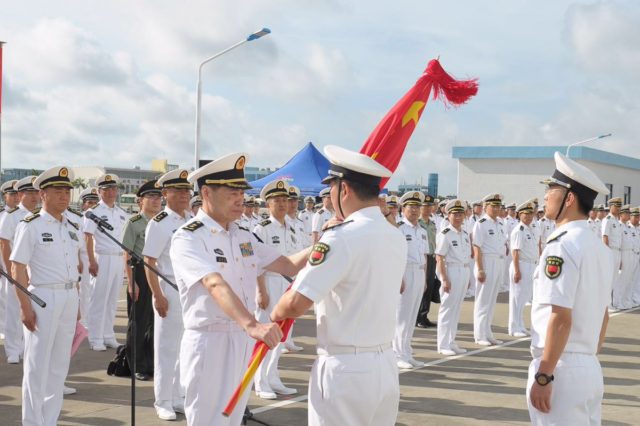
20,000 Li Over the Sea: China Sends Troops to First Permanent Base in Djibouti
Publication: China Brief Volume: 17 Issue: 10
By:

In Chinese, the term wan li (万里; 10,000 li) is frequently used to indicate “a long way away”. On July 11, China’s first unit to be stationed abroad at a Chinese-owned base departed Southern China for Djibouti, a journey of roughly 20,000 li (10,000 kilometers) across the Indian Ocean and the South China Sea. In the early 2000s, Chinese naval port calls far from China were rare. Whereas today, Chinese ships regularly visit foreign ports, and China has dispatched 26 escort taskforces to combat piracy in the Gulf of Aden—and to stretch the PLA Navy’s capabilities.
The PLAN will now have its first permanent support base (保障基地) overseas to resupply and repair Chinese ships operating in the region. The small detachment, composed of the Jinggangshan (井冈山), a type 071 amphibious assault ship, and the Donghaidao (东海岛), semi-submersible support ship (半潜船), left the dock at Zhanjiang, the home of China’s Southern Fleet (SSF) to great fanfare. PLAN Commander ADM Shen Jinlong (沈金龙), formerly Deputy Commander of the Southern Theater Command and Commander of the SSF, presented the detachment’s commander with a PLA banner. The PLAN’s top Commissar, Miao Hua (苗华), also gave remarks.
The unit’s departure represents the culmination of several years of careful diplomacy. In 2014, Central Military Commission member and Minister of Defense GEN Chang Wanquan (常万全) signed a ten-year agreement with Djibouti’s Minister of Defense Hassan Darar Houffaneh (Xinhua, February 26, 2014). In the run-up to the establishment of the port, China has invested heavily in Djibouti. Their bilateral trade is $2 billion and imports of Chinese goods make up 54 percent of Djibouti’s total (FMPRC, July 2016; OEC, 2015).
In late 2016, CMC Vice-Chairman GEN Fan Changlong (范长龙) and inspected the Djibouti facility during a port visit for resupply from the PLAN’s 24th Escort Taskforce (CCTV, November 27, 2016). Addressing the taskforce, GEN Fan urged them to “improve coordination, speed-up construction [of the base] […] and provide strong support for military operations to carry out overseas missions.”
China’s obvious interest in Djibouti raised alarm in the United States due to the presence of Camp Lemonier, a U.S. UAV and Special Forces base that played an important role in the Global War on Terror. Even Japan, which has had a presence in the small country since 2011, in 2016 decided to expand its base, apparently in response to China (Sina, October 14, 2016).
China has built overseas bases (基地) or stations (站) before—it maintains a space monitoring facility in the deserts outside Neuquen, Argentina (China Brief, October 2, 2015; Sohu, May 26, 2016). But Djibouti is the first overt and explicitly military-related outpost. Chinese naval ships already visit the port an average of four times a year, and this will only increase as China expands its far-seas maritime operations.
In the lead-up to the establishment of the base, Chinese media was careful to insist it had limited use and, until recently, was described as Support Facilities (保障设施) rather than a Support Base (保障基地). [1] Although China has downplayed the military implications of the base, within China “Support Base” has a specific definition, and only Chinese officers of a certain grade (Corps Deputy Leader) are able to command them. Key naval facilities such as those at Lushun, (旅顺), Qingdao and Sanya, for example, are described as Support Bases, or for larger facilities Comprehensive Support Bases (综合保障基地). Six Joint Logistics Support Bases (联勤保障基地) form the backbone of China’s internal military logistics system. Building bases abroad then need to be understood as an expansion of China’s preexisting military logistics organization.
Logistics has been a major failing of the PLA by its own assessment: it is seen as holding back China’s drive for an effective military (China Brief, May 9, 2013). The General Logistics Department was plagued with corruption scandals. GEN. Gu Junshan (谷俊山) and Zhou Guotai (周国泰), both senior leaders in the organization, were felled by corruption investigations. Major reforms in 2012 and in 2015 streamlined logistics and refocused them on joint operations. [2]
Some hints about how Chinese support bases would function in a wartime scenario can be found in authoritative textbooks. In the 2006 edition of the Science of Campaigns, descriptions of offensive campaigns against coral reefs (i.e., in the South China Sea) explicitly included the use of Advanced Support Bases (前进保障基地) and Seaborne mobile support (海上机动保障) to aid operations. Bases like Djibouti and ships like the Donghaidao (东海岛) semi-submersible support ship could be used in these types of operations.
The Djibouti support base is likely just the first of many as China improves its ability to protect the trade routes that form the vital arteries of its economy. This base, and those that follow should be viewed in the same light as the infrastructure projects China is driving across Asia, connecting it through an expanding web of pipelines, highways and railways to the rest of the global economy.
Peter Wood is the Editor of China Brief. You can follow him on Twitter @PeterWood_PDW
Notes:
- Mattieu Duchatel noted that the term used has shifted, as it was originally Support Infrastructure (保障设施).
- Nan Li, “The People’s Liberation Army Navy as an Evolving Organization,” in The PLA as Organization 2.0, Kevin Pollpeter and Ken Allen, Eds. p. 316.




